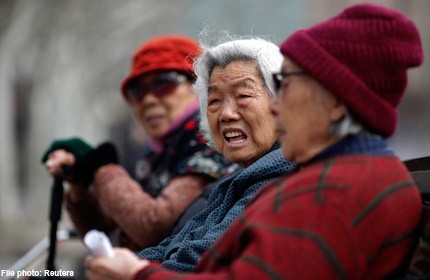Japan's population falls 259,000 in 2011

Japan's population plunged more than 250,000 in the year until Oct. 1, with the number of children declining precipitously during this period, according to the government.
The Internal Affairs and Communications Ministry's Current Population Estimates put the population at 127,799,000, down 259,000 from a year ago, a record 0.2 per cent decline since comparable data became available in 1950.
The number of children aged up to 14 against the total population was a record low 13.1 per cent, while the number of people aged 65 or older was the highest ever at 23.3 per cent.
The population estimates, which are based on national censuses carried out every five years, include foreign residents.
To calculate the total population, the internal affairs ministry used data from the Health, Labor and Welfare Ministry on natural changes in population--the number of births minus deaths--and social changes--the number of persons who entered Japan minus those who left.
This is the third time Japan's population has decreased following 2005 and 2009, but the number of births was the lowest ever at 1,073,000.
With deaths outnumbering births by 180,000, the population in the natural change category declined for the fifth year in a row. The decrease is widening year by year.
According to the estimates, the number of children aged up to 14 totaled 16,705,000, a record low, while the elderly population rose 268,000 from a year ago to 29,752,000, an all-time high.
"The figures indicate the pace of the nation's graying is accelerating," an internal affairs ministry official said.
In the social change category, the population fell 79,000 from a year ago. Of them, non-Japanese residents who lived in Japan for 90 days or longer fell 51,000, the largest decline ever.
In looking at the child population, working generation (15 to 64) and the elderly, the ministry said the elderly outnumbered the child population in 46 of the 47 prefectures. Okinawa Prefecture was the exception.
In Hokkaido and 23 other prefectures, people aged 75 or older outnumbered children.
The impact of the last year's Great East Japan Earthquake and the crisis at Tokyo Electric Power Co.'s Fukushima No. 1 nuclear power plant were seen in the population estimates, particularly in the number of people who left Japan.
Fukushima Prefecture saw the largest decrease in population, with a 1.93 per cent decline from a year ago.
Iwate Prefecture suffered a 1.21 per cent drop, followed by a 1.03 per cent decline in Akita Prefecture and a 0.91 per cent plunge in Miyagi Prefecture.